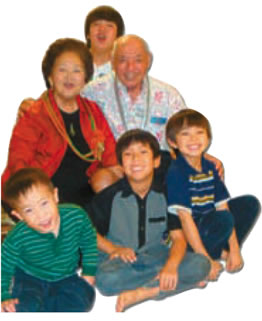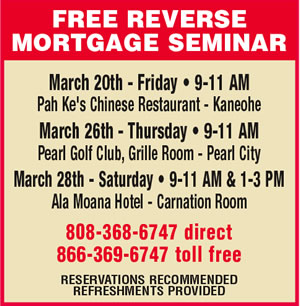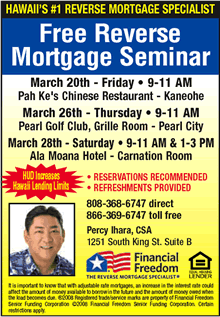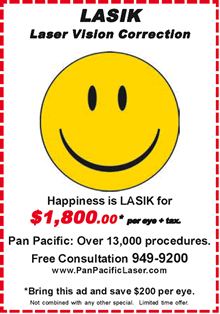New National HUD Reverse Mortgage Limit Raised To $625,500

Q. What is a reverse mortgage?
A. A reverse mortgage is a loan that enables senior homeowners,age 62 and older,to convert part of their home equity into tax-free* income-without having to sell their home, give up title to it, or make monthly mortgage payments. The loan becomes due when the last borrower (s) permanently leaves the home. * Consult Financial Advisor. Not all products available in all states.
Q. Who can qualify for a reverse mortgage?
A. Seniors 62 years of age or older may qualify. There are virtually no income or credit qualifications.
Q. How is a reverse mortgage like an equity line? How is it different?
A. Both a reverse mortgage and a home equity loan use the equity you have built up in your home to provide you with readily available cash.
They differ in that with a home equity loan you must make regular monthly payments of principal and interest. However, with a reverse mortgage you do not make any required monthly mortgage payments for as long as you stay in the home.
Q. Can my current income influence my ability to get a reverse mortgage?
A. No. Since reverse mortgage borrowers need not make monthly repayments, there are no income qualifications.
Q. What are the advantages of a reverse mortgage?

A. There are many. Here are a few of the most significant:
* Remain independent. A re-verse mortgage allows you to remain in your home and retain home ownership.
* Stay in your home. It allows you to remain in your home and retain home ownership.
* No monthly mortgage payments required. You need not pay back the reverse mortgage loan nor make any monthly mortgage payments until you permanently move out of the home.
* Tax-freee money. Because the money you receive from a reverse mortgage is not considered income,it is tax free
* and will not affect your Social Security or Medicare benefits.
* Freedomm andd flexibility. The money you get from a reverse mortgage is yours to use in any way you choose.
* Consult Tax Advisor
Q. I’ve heard that with a reverse mortgage the lender will own my home? Is this true?
A. It’s absolutely false. The borrower retains title to the property.
The reverse mortgage lender is merely extending a loan to the borrower.
Because the homeowners retain title, they remain responsible for the payment of property taxes, hazard insurance, and maintaining the home in reasonable condition - just as they would with a standard first mortgage or home equity loan.
Q. Can I refinance a reverse mortgage, as I would be able to do with a traditional mortgage?
A. Yes. Refinancing can make sense if your home increases in value and/or interest rates drop.
Q. Can a reverse mortgage lender take my home if I outlive the loan?
A. No they cannot. And the loan is not due at that time either. In fact, you don’t need to repay the loan as long as you or another borrower continues to live in the house as the primary residence and keep the taxes paid and hazard insurance in force.
Q. How do you determine the amount of cash I am eligible for?
A. The amount you can borrow depends on several factors, including your age, the type of reverse mortgage you select, current interest rates, the appraised value of your home and FHA’s lending limits for your area. In most cases, the older you are, the more valuable your home, and the less you owe on it, the more money you can get.
Q. I still owe money on my first or second mortgage. Can I still get a reverse mortgage?
A. Yes. You may be eligible for a reverse mortgage even if you still owe money on a first or second mortgage. The funds you would receive from the reverse mortgage would be used to pay off whatever existing mortgages you have on the property.
Q. Would a home in a “living trust"be eligible for a reverse mortgage?
A. Yes. In most cases a homeowner who has put his or her home in a revocable living trust can usually take out a reverse mortgage.A review of the trust documents would be conducted by the reverse mortgage lender to determine if anything in the living trust would be unacceptable.
Q. Other than repaying the interest and principal, what kinds of fees are involved in a reverse mortgage?
A. Most reverse mortgages have an application fee (which may cover the cost of a credit report and an appraisal), an origination fee, closing costs, insurance, and a monthly servicing fee. These charges can be paid from the proceeds of the reverse mortgage, resulting in no immediate burden to the borrowers; the costs are added to the principal and paid with interest when the loan becomes due.
Q. Are reverse mortgage rates fixed or variable?
A. Most reverse mortgages extended to seniors to date have variable rates that are tied to a financial index and will vary according to market conditions. However, Financial Freedom recently began offering a fixed rate HECM program.

Q. If I take out a reverse mortgage, will I still have an estate that I can leave to my heirs?
A. When you sell your home or no longer use it as your primary residence,you or your estate must repay the lender for the cash received from the reverse mortgage, plus interest, monthly service fees and any other accrued costs. Any remaining equity belongs to you or your heirs. It’s important to remember that you can never owe more than the home’s appraised value when it is sold. None of your other assets will be affected by your reverse mortgage loan.
E-mail this story | Print this page |
Comments (0) | Archive |  | RSS
| RSS
Most Recent Comment(s):




 Del.icio.us
Del.icio.us











